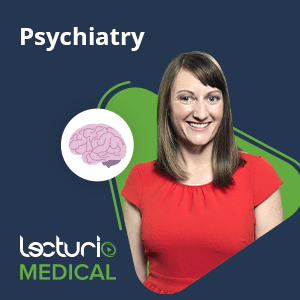Author Lisa Olivera said, Just because no one else can heal or do your inner work for you doesn’t mean you can, should, or need to do it alone. People with psychiatric disorders can feel isolated and hopeless. It can feel like no matter what they do, nothing works. That’s where psychiatry comes in. This article will help prepare you for psychiatry in both the classroom and hospital. So first, let’s start with defining psychiatry:
What Is Psychiatry?
Psychiatry vs psychology
Psychiatry focuses on mental, emotional, and behavioral disorders.
In contrast to psychologists who focus on psychotherapy, psychiatrists focus on prescribing medication. This is because they have gone through medical school; however, some places do allow psychologists to prescribe medication.
What are psychiatric disorders?
Meanwhile, psychiatric disorders are disturbances in how a person thinks, feels, and behaves. What makes them disorders is mainly based on how it affects a person’s daily life.
Disorders don’t include disturbances from stressful events, the influence of substances, or organic diseases. However, a stressful event can trigger episodes. Thus, psychiatric disorders can be seen as “rule-out diagnoses.” But that doesn’t mean they should be easily overlooked.
What Makes Psychiatry Hard to Study?
Psychiatry studies diseases of the mind. This can overlap with neurology, which studies diseases of the brain.
The human mind is hard to understand. Therefore, it’s hard to diagnose. There are no imaging or blood studies to diagnose mental disorders. Instead, there is a list of symptoms that patients need to match to be diagnosed with a mental illness.
Apart from that, these diseases can manifest in various ways, so it can be hard to diagnose and catch signs of mental illness in some people. You also have to consider other sources of the symptoms. For example, hyperthyroidism can manifest with anxiety. So, even if you know you’re studying psychiatry, you still have to keep other organic diseases in mind.
Psychiatric patients are also not the most cooperative bunch. Numerous patients don’t even know that they have a disorder. This fact can get in the way of obtaining information from patients and eventually treating them. Many patients have disorganized thoughts, so most conversations can last hours. That’s why when you interview patients, you have to be ready for them to be uncooperative and inconsistent.
Take the Course: Psychiatry
Take a deep-dive into psychiatric disorders and forensic psychiatry with Dr. Helen Farrell from Harvard Medical School.
Related videos
Tips for Psychiatry
Psychiatry can be a fun subject. For me, it was one of my favorite subjects. There was something about understanding how people think that interested me. As I mentioned, it is different from your other subjects, and it can be a welcome change of pace. On the other hand, it can also throw you off your groove. So, here are a few tips to help you navigate psychiatry classes:
#1: Change your mindset
Psychiatry is different from your usual pathology subjects. It requires you to understand how people think. To do that, you have to put yourself in their shoes. You also have to see them as a whole person with multiple factors leading up to the onset of their symptoms. What triggers does the patient have? Who influenced them the most growing up? What kind of support system do they have? What are the significant events that led them to act a certain way? All these questions can help you know your patient better and eventually manage them.
You can’t approach psychiatric problems the same way as organic diseases.
Rather than looking through labs and imaging studies, you have questionnaires and inventories. Rather than simply giving medications, you also have to know the types of therapies available for patients. You will still need to sometimes perform labs and imaging studies to rule out organic causes.
Patients are people too. There’s a lot of stigma surrounding the topic of mental health. Because of that, some see them as dangerous, incompetent, or even at fault for their condition. Remind yourself that everyone is unique. No one is weaker or stronger than another person. No one has things better or worse. If things turned out differently for you, who’s to say that you would have acted differently from your own patients?
#2: Watch good movies or shows
It’s hard to directly observe patients while you’re still in your classroom years. Instead, I suggest watching movies and shows that portray the disorders you’re studying.
It’s difficult to imagine how a person would act in a manic episode. It’s even harder to imagine having these disorders yourself. Accurate portrayals put these disorders into perspective. They can show you the viewpoint of doctors or therapists treating mentally ill patients. You can see how families and friends deal with someone with substance abuse. Sometimes, you can see the perspective of people with personality disorders.
Of course, not all movies and shows are medically accurate. Even if some movies are based on true stories, it’s impossible to paint a perfect picture of all psychiatric patients. So, be careful when trying to generalize the experience of fictional characters with actual patients. Misinformation can be more damaging than you realize. However, with the right content, watching good movies and shows is a fun and effective way to learn. There are accurate representations out there; you just have to do your research.
#3: Compare and contrast the disorders
Psychiatric disorders have their own categories. It sounds simple, but you’ll find that generalizing a spectrum of mental illnesses can lead to errors. That’s because symptoms from different disorders can overlap. For example, you can have a patient with symptoms of depression and schizophrenia. What distinguishes depression with psychotic features and schizoaffective disorder? Does it come down to which one came first or which is more severe?
Although a patient can have anxiety, there are multiple types. Is it social anxiety? Is it obsessive-compulsive disorder (OCD)? How does OCD differ from an obsessive-compulsive personality disorder? These questions are often asked because all of these disorders can be mistaken for one another.
So how do you differentiate them?
Whenever you learn about a new disorder, try to think about similar ones.
What symptoms do they share? Which manifestation stands out the most in these patients? Write a list and make a diagram if you must. Practice ruling your differentials in and out whenever you study a new case.
#4: Get good resources
You likely won’t find what you need in your Robbin’s Pathology textbook. In medical school, I used Kaplan and Sadock’s Summary of Psychiatry. I enjoyed reading this book because it was easy to understand. It included sections on differentiating disorders that look alike. It even had parts for different medications and therapies known to work best for patients with their respective disorders.
Let’s not forget to consult the main text of this subject:
The Diagnostic and Statistical Manual, 5th edition (DSM-5). This is the Bible of psychiatry. It determines the criteria you must follow to diagnose a patient.
Always have this open as you study your notes and lectures. You will often be asked for the symptom criteria and the time length needed for someone to qualify for a mental disorder.
#5: Know what’s normal vs. pathological
Much like organic diseases, you need to know what’s normal to know what’s pathologic. Unlike organic diseases, you can’t directly observe what’s wrong. The human body follows its own rules. Without illness, everyone’s bodily processes should work more or less the same. The human mind is not like that. How we think, feel, and behave sets us apart from others, and there’s no predetermined normal process for them.
So what counts as pathological? It’s something that isn’t normal for the patient. Usually, the onset of mental illness is when they’ve started to think, feel, or act differently. However, there are days we feel happy, and days we feel sad. Just because you’re a bit different today doesn’t mean you’ve developed a mental disorder. So the next qualifier would be distress. Are they having a hard time with things they used to find easy? Are they unable to function at home or outside the home? Are their relationships suddenly falling apart? What may seem normal for you may be different for others. Always keep that in mind.
#6: Mnemonics!
Mnemonics really helped me in this subject because the list of symptoms in the DSM-5 can be hard to memorize. For example, I always used the mnemonic SIGECAPS for the symptoms of depression. This stood for: Sleep, Interest, Guilt, Energy, Concentration, Appetite, Psychomotor, and Suicide. Of course, these mnemonics may not work for everyone, but there are a lot of symptoms that need to be memorized. I couldn’t find another way that worked better for me.
Some people use mind maps to organize psychiatric concepts. Others also make their own diagrams to connect similar ideas. For example, childhood abuse has been associated with multiple disorders. So you can link these events to the conditions that may arise, and vice versa, using a mindmap.
Surviving Psychiatry Rotations
This next part will be about your actual rotation. As you may have guessed, psychiatry patients are a new experience for many medical students. Many of us have met people with mental illness before, but working in a psychiatric ward is unlike any other rotation. Moreover, patient interviews in psychiatry are a new challenge. My first time in this rotation felt disorienting, even with my own background in psychology. So, here’s a guide that will (hopefully) help you feel a bit more prepared!
#1: Safety and boundaries
One of the first things I experienced in a psychiatric ward was patient violence. It’s something that rarely happens, but it does happen. So always remember that your safety comes first. Don’t try to be a hero or attack a patient. Always have an escape route. It sounds excessive, but you can never be too safe.
If a patient shows any sign of aggression, you need to leave.
For your own safety, avoid telling patients too much about yourself. You can share bits about yourself, but nothing personal. Never give things like your cellphone number or address. Always make sure the patient understands the nature of your relationship. So, set expectations early and draw a clear line.
Of course, while your safety is necessary, so is the patient’s safety. Always keep what they say confidential. When you speak to patients, you must make them feel safe around you. Let them know that what they share is between them and the medical team. That is, unless they reveal that they plan to harm themselves or others. Always keep safety at the forefront of your mind.
#2: Be patient and sensitive
Psychiatric patients can be especially sensitive. Many of them have triggers that you need to avoid. These triggers can seem like small things to others. Because of that, conversations can feel like walking on thin ice, but you must understand that recovery is stressful for anyone. One day a patient can be stable, and the next, they’re entirely different. So, be patient. Prepare yourself for a lot of ups and downs around them because recovery is not a linear path.
Leave your personal feelings outside of work. Start with a simple, “Hi, how are you doing?” Stay calm and keep your tone steady. Even small details like your body language and tone can trigger something. Also, let them know that you’re on their side. So, avoid sounding confrontational, even when you’re telling them about something they did wrong. Lastly, prepare yourself for a lot of uncooperative patients.
#3: Learn to deal with tough patients
Psychiatric patients, especially in the first few sessions, can be unstable. They could be in the middle of an episode. Maybe they came from toxic environments, so they’re not in the best state. Even therapy itself can be stressful for them.
So, accept that they won’t be cooperative from the get-go. In fact, patients can be abrasive and rude. They can be violent, flighty, incoherent, or antagonistic toward you for no apparent reason. When you come across patients like that, it’s okay to ask for help from a senior. They usually know the best way to approach uncooperative patients. If all else fails, take it a step at a time. Go at a pace comfortable for the patient and never force them to share more than they would like. If that fails, there’s nothing wrong with trying again later.
#4: Be ready for interviews to last longer than usual
Patient history-taking and physical exams are the bread and butter of your medical internship. Most of what you do in psychiatry will be listening. I’m sure that you already know the elements of a psychiatric patient interview. This is the time to put those skills to the test.
Conversations will go everywhere and anywhere in psychiatry. Your job is to navigate through your patients’ flights of ideas and incoherent thoughts. I know that can be tough during your first interview. There are guides online that can help you prepare for it. Lastly, you should know when to end an interview. When you think you or the patient gain nothing from more conversation, end it. Conversations can go on for hours, especially if it’s the first time seeing the patient. Be careful you don’t talk for too long.
#5: Reflect
Dealing with psychiatric patients is its own experience. It’s enriching and really puts life into perspective. Anything can happen. You’ll definitely come out with new stories and moments that’ll make you think. A lot. Not all experiences, however, are pleasant. My hospital allowed us to have optional debriefings about our time there. I suggest you find a way to process what happened during the rotation whenever you need it.
I personally had some less-than-delightful experiences in my rotation. After processing them, I decided to let go of my childhood dream of becoming a psychiatrist. While I enjoyed it overall, it wasn’t something I could imagine doing as a vocation. I still have a passion for mental health awareness. I still enjoy listening to others and helping them overcome their hardships. But I can safely say that it’s not for me. Psychiatry is a great field, and definitely has some of the strongest doctors I know. The rotation itself was memorable and helped me grow more empathic and sensitive as a doctor. I hope it also does the same for you.
Can You Answer This Psychiatry Practice Question?
A 40-year-old woman presents with complaints of a lack of concentration at work which has lasted for 3 months. She says that she has been working as a personal assistant to a manager of a corporate business company for the last 2 years. Upon asking why she is unable to concentrate, she answers that her colleagues are always gossiping about her during work hours and that this disrupts her concentration severely. Her husband works in the same company and denies these allegations. He says the other employees are busy doing their own work and have only formal conversations, yet the patient is convinced that they are talking about her. He further adds that his wife frequently believes that some advertisements in a newspaper are directed towards her and are published specifically to catch her attention, even though they are routine advertisements. The patient denies any mood disturbances, anxiety, or hallucinations. Her past medical history is significant for a tingling sensation in her legs, 3+ patellar reflexes bilaterally, and absent ankle reflexes bilaterally. She says that she drinks alcohol once to twice a month for social reasons but denies any substance use or smoking. On physical examination, the patient is conscious, alert, and oriented to time, place, and person. A beefy red color of the tongue is noted. No associated cracking, bleeding, or oral lesions are observed. Which of the following laboratory tests would be most helpful to identify this patient’s most likely diagnosis?
A. Serum ethanol level
B. Serum cobalamin level
C. Serum thiamine level
D. Serum thyroxine level
E. Serum folate level





